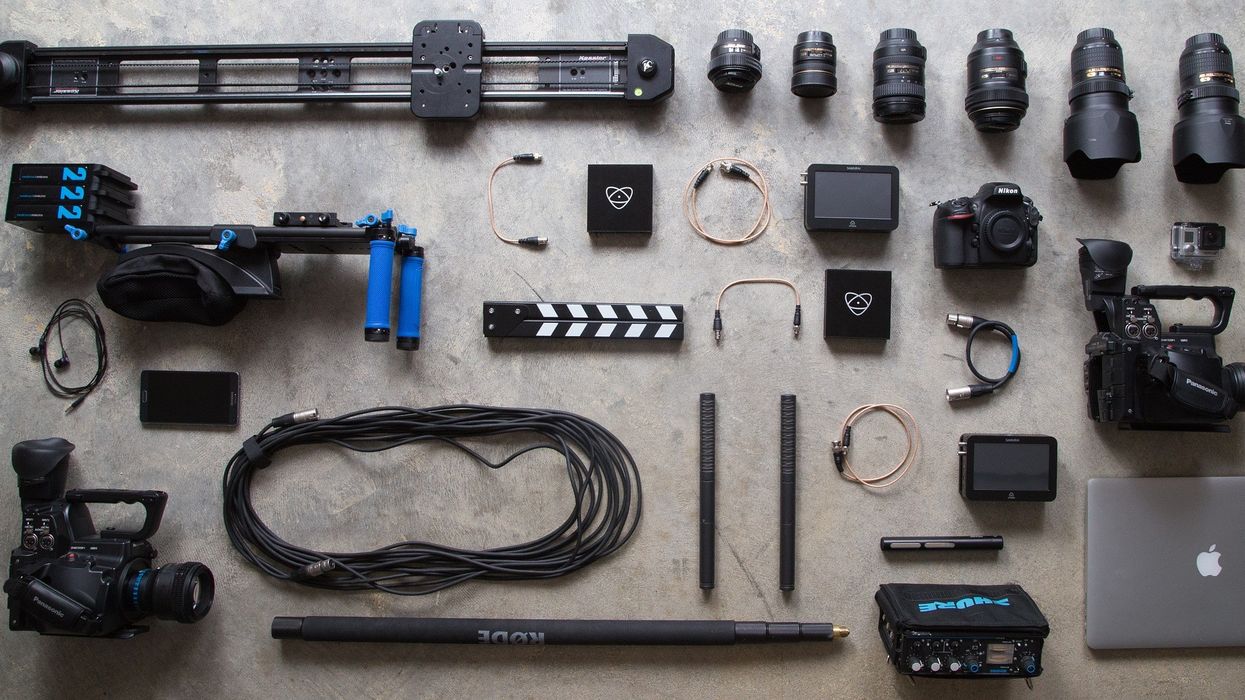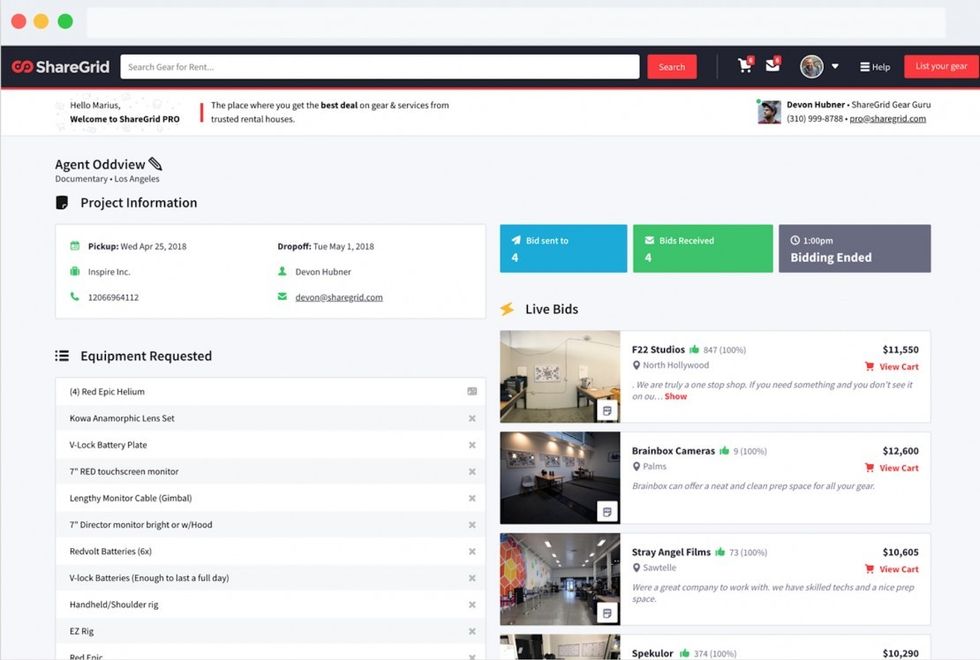Rental Houses Will Now Compete Online to Equip Your Project with ShareGrid PRO
Save 30-50% by having rental houses compete for a chance to provide your gear.

Three years ago, ShareGrid started an indie-style, peer-to-peer gear rental revolution that continues to this day, servicing seven cities, supporting over 45,000 members, managing more than $450 million worth of equipment, and saving renters sometimes considerable amounts of money on traditional rental costs. Friday afternoon in Los Angeles, the company formally announced the launch of ShareGrid PRO, its groundbreaking reimagining of the professional equipment rental market. Powered by patent-pending tech, ShareGrid PRO is a streamlined bid and book system that allows productions to solicit bids from over 20 local rental houses and then choose, book, and pay for the package they want without the logistical and clerical burdens that used to be an inescapable part of the process.
If you’ve worked on a project large enough to necessitate renting gear from more than a couple vendors, then you’re likely familiar with the frustration and time vacuum that is shuttling amongst the various rental houses, interfacing with sometimes inviting but oftentimes intimidating rental house staff, trudging through each operation's reams of redundant paperwork requiring your read and signature, somehow figuring out how to handle the imperative of insurance, and then the repeating the same multi-stop slog in reverse as you return everything once you’ve wrapped. ShareGrid PRO should help alleviate some of those rental pains. Now live, the core ShareGrid team of Marius Ciocirlan, Arash Shiva, and Brent Barbano started developing it in November 2017.
ShareGrid PRO is an ingenious solution to many of the challenges filmmakers and rental house owners alike experience.
How it works
Whoever is managing a production's rentals (so long as those rentals total no less than $2000) enters the entire list of gear she wants for her production into the "List Your Gear" field of the intuitive New Bid Request section on the landing page linked to above. If, in assembling this list, a ShareGridPRO client needs gear help or guidance—for instance, if a producer's DP wasn't clear about which fluid head tripod she wants, or if a UPM who doesn't know a camera deeply wants to understand his cinematographer's impassioned insistence on renting an Angenieux Optimo Zoom over a much cheaper SLR Magic—she can, at any time, consult PRO's Dedicated Gear Guru—a real, live human being who's a ShareGrid employee with rental house work experience, deep domain expertise, and 24/7 reachability online or on the phone (their number is clearly indicated).
But that's not all the Gear Guru does. After a client submits a bid request, but before rental houses' subsequent bids appear in the client's dashboard, the Gear Guru evaluates those prices, looking for numbers both conspicuously high and conspicuously low. If the discrepancy is sufficiently pronounced, the Gear Guru will communicate with the rental house to suggest cutting or boosting prices.
A brief pause on our walk through the rental process to note that the Gear Guru and the value such an impartial intermediary provides is, to my eye, one of several clear indicators that ShareGrid PRO is a singularly ingenious solution to many of the challenges filmmakers and rental house owners alike experience in what is presently an awfully opaque marketplace.
One of the defining challenges ShareGrid faced and surmounted early in its ascent was that of insurance. To insure an owner's gear with sufficient coverage, ShareGrid formed an exclusive partnership with Athos Insurance to build the first instant online insurance system for peer-to-peer rentals. Within minutes, you can purchase a competitively priced short-term or annual policy with coverage up to $750,000. This has been a key factor in ShareGrid’s fast growth, since it has provided equipment owners with the confidence to join such a new concept.
Back to the order at hand: after the client submits her request for bids, that request automatically turns into a project dashboard where she can see the bids that rental houses return, compare and contrast them, and even—and here's another one of those indicators I mentioned—message any of the rental houses with any questions or concerns she might have. One of the most brilliant facets of the PRO process is that it makes every production anonymous to the rental houses bidding on their project. What's so great about anonymizing bidders, you ask? It's an equalizing measure, to my mind—a mechanism by which all productions with an adequate budget to spend have an equal opportunity to secure their ideal package. No more politics, no more shutting out of certain production houses or producers.
Once the client selects a bid, she can checkout with her own insurance and credit card or her company's insurance and credit card or purchase-order already on file. Productions then communicate directly with the rental house by phone, SMS, email or through the web to arrange pickup and prep. No additional payment authorization forms, contracts, or separate communications are needed. No need to manage multiple accounts since ShareGrid serves as the agent for all the rental house.
Additional benefits
In a plus for convenience and transparence, the aforementioned messaging feature is for all to see—that is, every rental house that's bid and everybody with whom the client shares the rental link (à la Google Docs) can view the questions so that no question gets asked more than once, ideally no uncertainty persists longer than one or two exchanges, and those epic poem-length email threads we've all been on because Gary the Grip wants details on the Flag & Rag kit he's getting will be a thing of the past.
For context, let's remember that the gear rental business has traditionally been one of the more hazy marketplaces in the broader entertainment industry. If you've spent any time looking through online or printed rental catalogs, you're familiar with finding row after row of "Call For Price" instead of an actual number where the item's rental price should be listed. Then there's the common, price-inflating practice of sub-renting, where a rental house will show on its site or in its literature that it rents a certain item, but when you then try to rent that item, the rental house—who doesn't itself own said item, but has established a means of obtaining it, usually by renting it from another rental house, which has a corollary inflationary effect on the rental price of these goods.
By bringing transparency to the marketplace, ShareGrid PRO stands to pressure prices immediately down and rentals up.
Brick and mortar rental houses, who have had to adapt to the constant evolution of acquisition formats, have had to decide which cameras, lens sets and mounts, media capture and storage devices, and innumerable other critical pieces to purchase and to support. As the number of formats and, now, codecs, change rapidly, rental houses must be extremely cautious about building out stacks of technology that may be obsolete before it's even inventoried.
The traditionally convoluted, rental house-dominated process of sourcing gear was, before ShareGrid's entrance into the market, a constant pain point for filmmakers and productions of all levels. Equally, on the individual supply side, gear owners seeking to recoup their considerable investment into cameras, lenses, grip and electric equipment, accessories, etc. by making it available for rental found that even their best gear would often end up gathering dust on their shelves. By bringing transparency to the marketplace, ShareGrid PRO stands to pressure prices immediately down and rentals up.


 "'Back Home"via Mercedes Arutro
"'Back Home"via Mercedes Arutro 'Back Home'via Mercedes Arutro
'Back Home'via Mercedes Arutro 









